Granja Siete Hermanos, S.R.L – Crespo, Entre Ríos state, Argentina
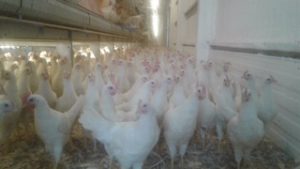 The Granja Siete Hermanos S.R.L., located in the province of Entre Ríos in the City of Crespo, Argentina, is owned and operated by the Eberle brothers. Founded by Don Jorge Roberto Eberle in the 1960s with a few cage-free hens, the farm has been family-operated for more than three generations. Today, seven Eberle brothers work side-by-side managing the daily operations of the farm.
The Granja Siete Hermanos S.R.L., located in the province of Entre Ríos in the City of Crespo, Argentina, is owned and operated by the Eberle brothers. Founded by Don Jorge Roberto Eberle in the 1960s with a few cage-free hens, the farm has been family-operated for more than three generations. Today, seven Eberle brothers work side-by-side managing the daily operations of the farm.
While the farm started cage-free in the 60s, it moved to battery cages in the 70s. “I still remember telling dad that we were going to move the laying hens to a barn and put them in battery cages,” says Hector Humberto Eberle, General Manager for Granja Siete Hermanos. “He told me that the chickens had to be free and that they were going to die locked up all day. I didn’t know how we were going to put so many chickens in a barn. We did, but my dad was right. It wasn’t a humane way to raise the birds.”
While many other farms in Argentina still operate with traditional pyramidal cages and battery cages, Granja Siete Hermanos is the first farm in Argentina to import a cage-free aviary system to meet Humane Farm Animal Care’s animal welfare standards for Certified Humane® laying hens.
“We learned about the Certified Humane® program through a client’s recommendation,” says Hector. “Once we learned about everything related to the welfare of the animals and that the guidelines were written by farm animal welfare experts, we decided to adopt their humane standards of care. We saw that you could respect animals, the environment and people while still being efficient in egg production.”
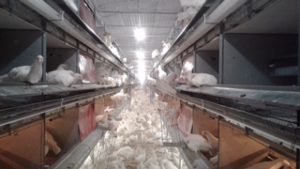 But Hector remembers being a little apprehensive when the new aviary system arrived. “The manufacturers told us that one of the biggest hurdles would occur at sunset when the laying hens would all be trying to find a place to sleep and none should be on the floor,” says Hector. “We were worried, but at sunset, we watched in amazement as every hen found a place to perch and sleep. It was unforgettable. We also worried that the hens would not use the nests to lay their eggs, but we were wrong. The hens wanted privacy, and they were very comfortable with these new nesting spaces.”
But Hector remembers being a little apprehensive when the new aviary system arrived. “The manufacturers told us that one of the biggest hurdles would occur at sunset when the laying hens would all be trying to find a place to sleep and none should be on the floor,” says Hector. “We were worried, but at sunset, we watched in amazement as every hen found a place to perch and sleep. It was unforgettable. We also worried that the hens would not use the nests to lay their eggs, but we were wrong. The hens wanted privacy, and they were very comfortable with these new nesting spaces.”
Hector says that once the farm implemented HFAC’s animal welfare standards and saw how easily the laying hens adapted to their new aviary, they knew they were making the right decision and trusted the Certified Humane® practices would contribute to the overall welfare of their laying hens.
“We can see the impact on the hens every day,” says Hector. “We are raising happy animals that are free to express their natural behaviors, like stretching their wings, scratching, perching and nesting. Our farm is proof that you can raise Certified Humane® laying hens and not impact production parameters.”
Hector says, “More and more news stories, books, films, and reports draw attention to how farm animals should be treated. As a result, consumers want products from animals that are humanely-raised. The Certified Humane ® label identifies our products for businesses and consumers looking for those products… Being Certified Humane® is good for our business, our animals and our customers.”
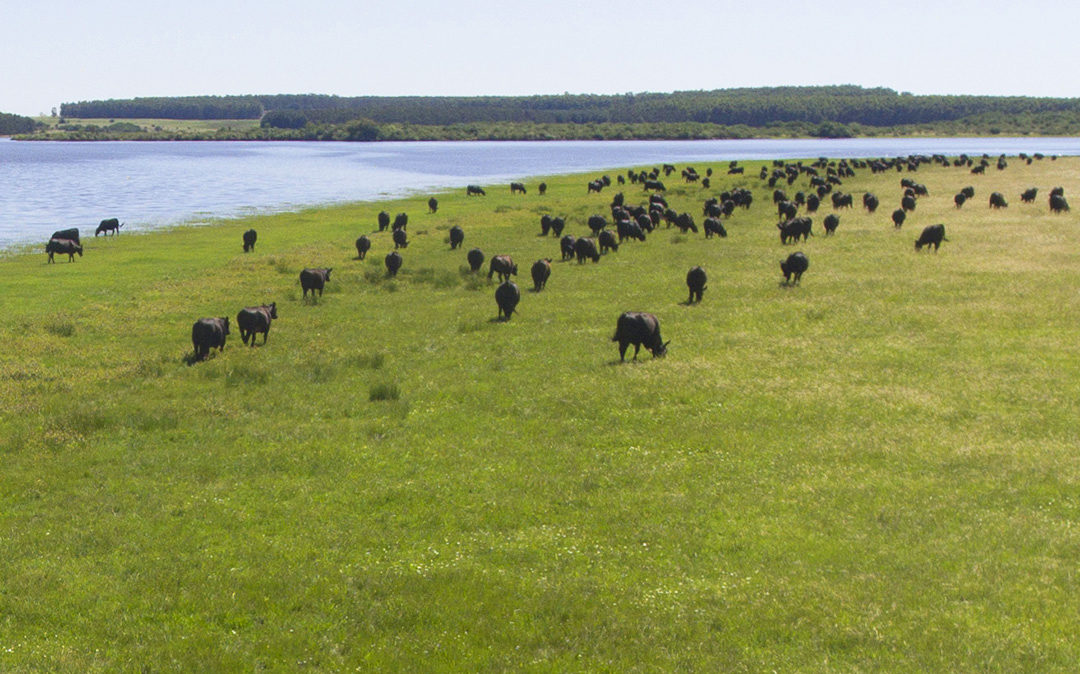


Posted: April 29, 2019 by Certified Humane®
Drake Family Farms
Drake Family Farms, Ontario, California. Where every goat has a name!
Drake Family Farms cheeses are both “farmstead,” and “artisan.” “Farmstead,” means made on the farm with milk exclusively from the farm’s own animals. According to the American Cheese Society, the word “artisan or artisanal,” implies that cheese is produced primarily by hand, in small batches, with particular attention paid to the tradition of the cheese maker’s art, and thus using as little mechanization as possible in the production of the cheese.
The secret to making the best cheese is to use only the highest quality milk. The best quality milk comes from happy healthy goats. Dan Drake is the veterinarian who has been overseeing the health of the Drake Family Farms goatherd for the past 26 years. All the goats have names and are registered with the American Dairy Goat Association. The goats are housed in open housing with indoor and outdoor areas and allowed to go wherever they please. They do not eat corn or soy, but do delight in the greenest alfalfa hay you have ever seen. They are our pets!
Drake Family Farms are currently producing fresh chevre at the farm. They use the finest French cultures. It is incubated for twelve hours and then drained in bags to give it a wonderful smooth texture and taste. All of our chevre cheese is packaged in tubs, which make great storage containers so you can eat a little bit of and snap the lid back on to keep it fresh for the next day. We recommend everyone have a few tubs in the freezer in case you have a goat cheese emergency!
Our raw goat milk cheese are made from real raw goat milk. We take raw goat milk from the goats on our farm and then make the cheese. We do not add preservatives or mold inhibitors. We do add salt to the cheese, which has a preservation effect. As long as the cheese stays vacuum-sealed, you can keep it in the fridge for months or even years! Visit us on Facebook to see events, our farm store and join a tour at Drake Family Farms Goat Dairy California. DrakeFamilyFarms.com
Posted: March 29, 2019 by Certified Humane®
Chew’s Agriculture Pte Ltd
Chew’s Agriculture Pte Ltd: the first Certified Humane® Egg Producer in Singapore
Chew’s Agriculture Pte Ltd was already using cage-free management systems for laying hens when they first reached out to the Certified Humane® Program through contacts at Humane Society International. “We are a family of farmers and have always worked closely with our animals. They are like family too so of course their welfare is very important to us,” says company director Edvin Lim. “We already had a cage-free product so it was only natural that we joined the Certified Humane® program to bring our system to an international standard.”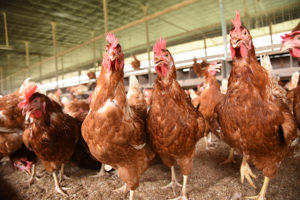
In 2014, Chew’s Agriculture Pte Ltd predicted that there would be a demand for humane products in South East Asian supermarkets and began investing in the latest and best techniques for cage-free systems which allowed birds to have enough space to express natural behaviors such as foraging, interacting with other hens, and dust bathing. Chew’s Agriculture Pte Ltd believes that allowing the birds to behave this way keeps them happy and healthy, which improves the egg quality and in turn helps the company market cage-free eggs to its consumers.
Posted: March 29, 2019 by Certified Humane®
Toh Thye San Farm in Singapore, Certified Humane® Chicken Products
As Toh Thye San Farm evolved, first as a farm and supplier to local markets in Singapore, and then again to meet environmental changes, Toh wanted to make sure that broiler chicken production continued to reflect the values upon which his family’s business was founded. “Certified Humane® is one of the names that came up on our radar immediately as it is an international certification with presence in the most countries and equipped with really strong animal welfare standards,” says Toh. “Both the Certified Humane® program and our philosophy are built on responsible and ethical farming, putting superior animal welfare and best practices as its core. We are the number 1 fans of our own produce and we have a conviction that ethical and responsible farming translates to the best tasting meats.”
Today, Toh Thye San Farm, and management company Gesing Group Sdn. Bhd, supply Certified Humane® chicken products to restaurants and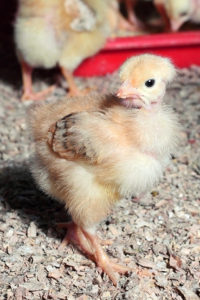 food production facilities throughout Singapore. “We believe in going back to basics when it comes to farming, however we adopt modern technologies to help raise the quality of the product and also to reduce manpower requirements so that the products will be more consistent,” says Toh. “When you come to our farms, you will notice that the chickens would walk towards you and crowd around you. This actually translates to the chicken being really comfortable with humans because they have been really well taken care of by the farmers and that is something that we are really proud of.”
food production facilities throughout Singapore. “We believe in going back to basics when it comes to farming, however we adopt modern technologies to help raise the quality of the product and also to reduce manpower requirements so that the products will be more consistent,” says Toh. “When you come to our farms, you will notice that the chickens would walk towards you and crowd around you. This actually translates to the chicken being really comfortable with humans because they have been really well taken care of by the farmers and that is something that we are really proud of.”
Certified Humane® chicken products from Toh Thye San Farm can be found in fine-dining restaurants throughout Singapore. “We are delighted to be serving the best restaurants in Singapore,” writes Toh. “This is a testament to our product quality and its suitability for every type of cuisine. Our customers are critically acclaimed and are recognized internationally with the receipt of awards such as Top 100 best in the world, of which we are proud to be supplying 2 out of the 3 inductees from Singapore.” For more information about Toh Thye San Farm products, visit their website at www.oeo.com.sg.
Posted: March 4, 2019 by Certified Humane®
Granja Siete Hermanos
Granja Siete Hermanos, S.R.L – Crespo, Entre Ríos state, Argentina
While the farm started cage-free in the 60s, it moved to battery cages in the 70s. “I still remember telling dad that we were going to move the laying hens to a barn and put them in battery cages,” says Hector Humberto Eberle, General Manager for Granja Siete Hermanos. “He told me that the chickens had to be free and that they were going to die locked up all day. I didn’t know how we were going to put so many chickens in a barn. We did, but my dad was right. It wasn’t a humane way to raise the birds.”
While many other farms in Argentina still operate with traditional pyramidal cages and battery cages, Granja Siete Hermanos is the first farm in Argentina to import a cage-free aviary system to meet Humane Farm Animal Care’s animal welfare standards for Certified Humane® laying hens.
“We learned about the Certified Humane® program through a client’s recommendation,” says Hector. “Once we learned about everything related to the welfare of the animals and that the guidelines were written by farm animal welfare experts, we decided to adopt their humane standards of care. We saw that you could respect animals, the environment and people while still being efficient in egg production.”
Hector says that once the farm implemented HFAC’s animal welfare standards and saw how easily the laying hens adapted to their new aviary, they knew they were making the right decision and trusted the Certified Humane® practices would contribute to the overall welfare of their laying hens.
“We can see the impact on the hens every day,” says Hector. “We are raising happy animals that are free to express their natural behaviors, like stretching their wings, scratching, perching and nesting. Our farm is proof that you can raise Certified Humane® laying hens and not impact production parameters.”
Hector says, “More and more news stories, books, films, and reports draw attention to how farm animals should be treated. As a result, consumers want products from animals that are humanely-raised. The Certified Humane ® label identifies our products for businesses and consumers looking for those products… Being Certified Humane® is good for our business, our animals and our customers.”
Posted: March 4, 2019 by Certified Humane®
Tecnovo SA
Tecnovo S.A. – Crespo, Entre Ríos, Argentina
Tecnovo S.A. is committed to using Certified Humane® eggs to produce their liquid and powdered egg products, which are then sold to food manufacturing companies to be used in the production of foods such as mayonnaise, pasta, puddings, sweetbreads, pastries, and cookies. This means that Tecnovo S.A. only sources Certified Humane® eggs before moving them along in the supply chain to large food manufacturers.
“The Certified Humane® movement has had an enormous impact on the growth of global food chains, especially as they apply in Latin America,” says Luiz Mazzon, Director-General for Certified Humane® Latin America. “More and more companies are considering animal welfare when choosing their supplier of animal ingredients. The Certified Humane® program is innovative because it allows the use of the label even by companies that do not raise or handle animals directly, but are committed to using Certified Humane® products.” The philosophy of Tecnovo S.A. founders was to create a value chain that enhances the natural resources of the area, incorporating skilled labor and appropriate technology to enable it to access the food producers worldwide.
Tecnovo S.A. also guarantees the quality of the products by working under GFSI (Global Food Safety Initiative) standards with food certification systems FSSC 22000 (Food Safety System Certification) for continuous improvement of the food safety management system with the aim of ensuring the supply of safe food to consumers.